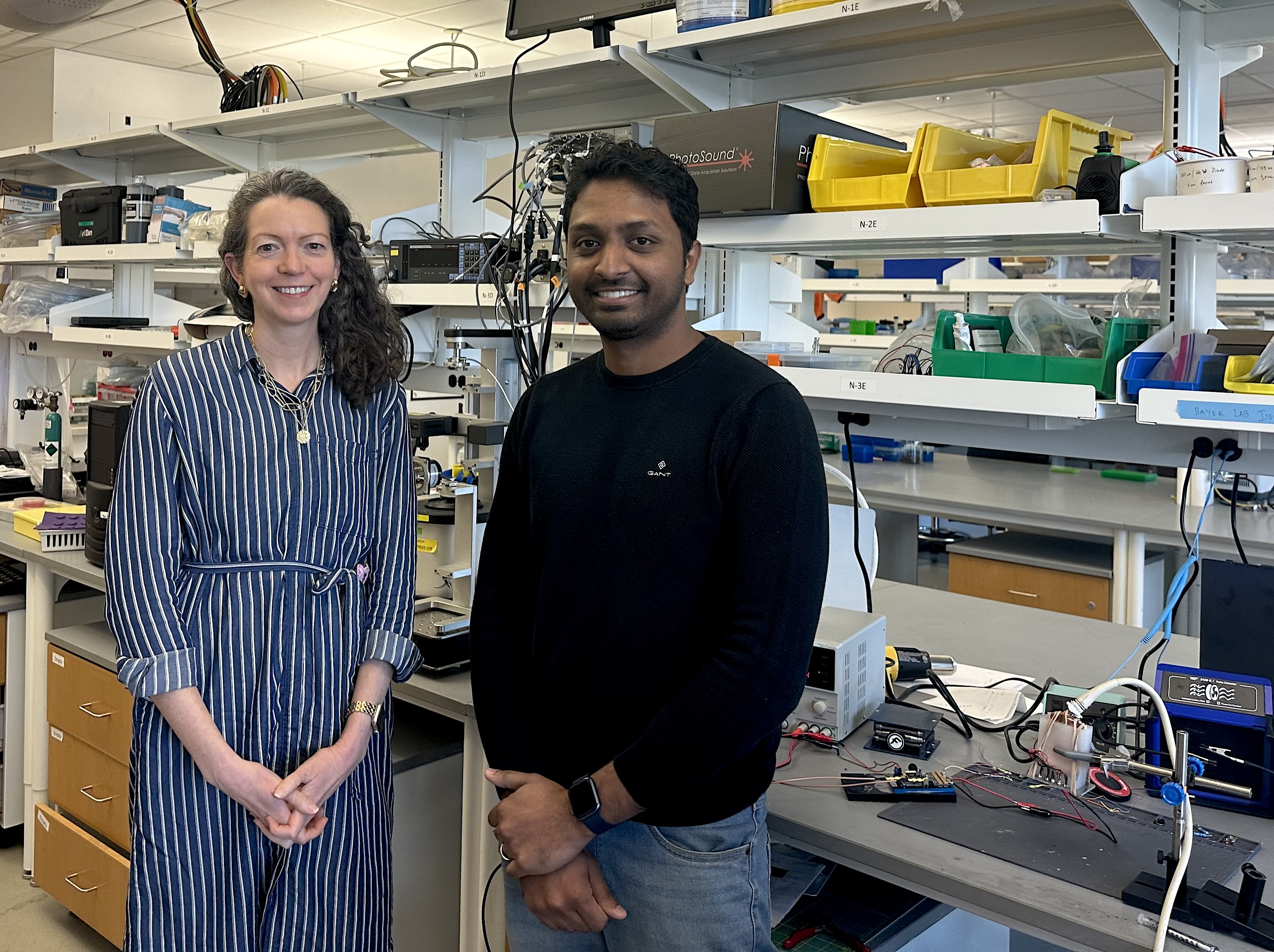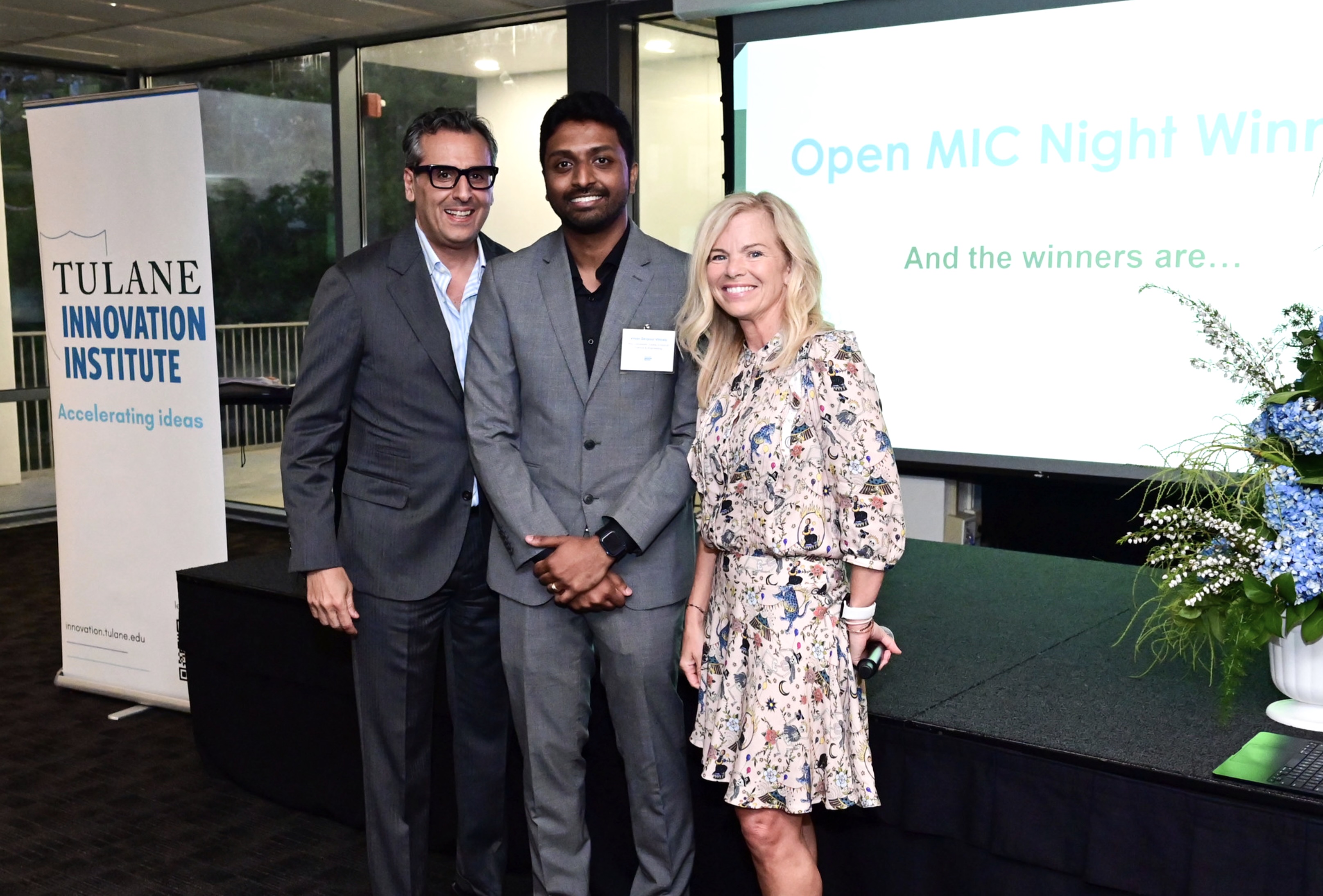NSF I-Corps Guides Carolyn L. Bayer and Vinoin Devpaul Vincely in Advancing Portable Imaging Technology for Vascular Disease Diagnosis

Dr. Carolyn L. Bayer, Associate Professor of Biomedical Engineering at Tulane University's School of Science and Engineering, in collaboration with doctoral candidate Vinoin (Vin) Devpaul Vincely, are developing a novel portable imaging device that utilizes photoacoustic technology for the early detection of vascular pathologies such as peripheral arterial disease (PAD).
Photoacoustic (PA) imaging, developed in the early 2000s, is a rapidly emerging technique that utilizes pulsed laser light to generate ultrasound waves. These waves can be detected by traditional clinical ultrasound systems with similar images. The use of light allows direct visualization of light-absorbring substances such as hemoglobin and its different species. “Think of it as ultrasound with the capabilities of pulse oximetry, allowing doctors to see the health of imaged tissue”, stated Vincely. Dr. Bayer pioneered the use of PA imaging for obstetrics, trained under biomedical imaging specialist Dr. Stanislav Emelianov during her postdoctoral fellowship at the University of Texas. Now, in 2025, this Tulane research team is investigating approaches to improve the portability of the modality while exploring different applications of monitoring tissue oxygenation, a critical biomarker for tissue hypoxia.
Bayer and Vincely previously secured funding through the Tulane Innovation Provost's Proof of Concept (PPOC) Fund in Spring 2023, which provides $50,000 grants to advance faculty and trainee technologies toward commercialization. "The PPOC funding was instrumental in prototype development; while traditional grant mechanisms support our fundamental research, this award enabled us to engineer techniques for improving the system’s portability," Vincely explained.
With a prototype complete, the team Initially focused on prenatal applications for their portable device. However, following their participation in the National Science Foundation's (NSF) Innovation Corps (I-Corps™) program in conjunction with the Tulane Innovation Institute in the Fall of 2024, Bayer and Vincely identified a significant clinical need in cardiology for enhanced diagnostic tools for vascular pathologies. They observed that current diagnostic tools cannot sensitively assess tissue health and recovery of diseases such as PAD. In the United States, PAD affects ~12 million individuals with the prevalence exceeding among older populations. Moreover, they note that PAD is a global issue with occurrences over 200 million, disproportionally affecting those from lower middle-income countries due to a lack of medical infrastructure, leading to severe presentations that require limb amputations. Hence, they envision the PA probe as a groundbreaking advancement that will profoundly improve clinical outcomes for PAD patients, offering hope and transformative care.
As demonstrated by Bayer and Vincely, the NSF I-Corps program helps bridge the gap between scientific discoveries in the lab and real-world medical applications. Through collaboration with the MIT Innovation Hub, researchers can refine their innovations to fit clinical needs better and move toward real-world use. "The Tulane Innovation Institute actively promotes engagement with the NSF I-Corps program as it provides a valuable mechanism for emerging innovators to advance their work outside of laboratory environments and establish an early pathway toward translating their research into practical applications with societal impact," stated Clay Christian, Executive Director of Commercialization, Tulane Innovation Institute. "This initiative further serves as a networking platform, enabling Tulane University scientists to forge collaborative relationships with peers across national research institutions," he continued.

Vincely further developed his entrepreneurial expertise through participation in the Tulane Innovation Institute Open Medical Innovation Challenge (Open MIC) Night in the Spring of 2024. This event facilitated refining his presentation techniques in preparation for future investor engagements. Now with his dissertation complete, he aims to establish a commercial venture based on this technology and is actively pursuing strategies to secure additional investment for subsequent development phases.
With continued support from the Tulane Innovation Institute and programs such as I-Corps and the PPOC Fund, Bayer and Vincely exemplify researchers making substantial progress toward commercializing their scientific discoveries. Their academic-entrepreneurial trajectory demonstrates how structured innovation training can catalyze advancements in healthcare technology. This case study represents the growing ecosystem of innovation at Tulane University that is poised to address critical unmet medical needs through entrepreneurial scientific advancement.
